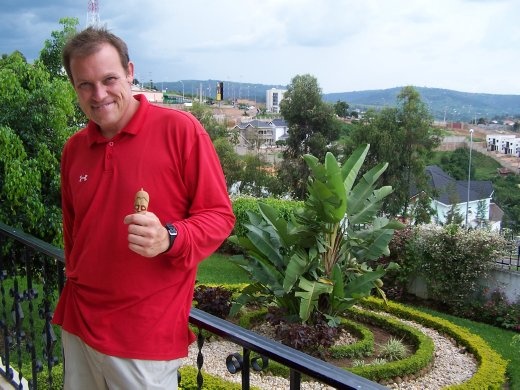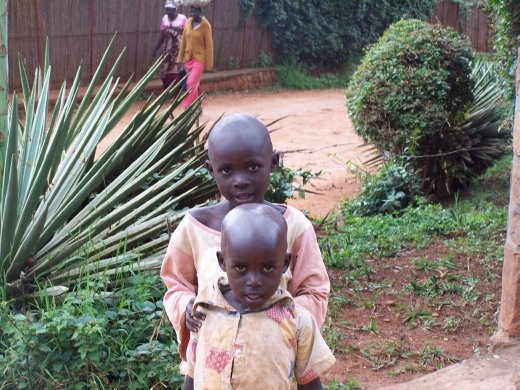The clouds were heavy, black, and pendulous as we flew in to Kigali airport, Rwanda. As we cleared the cloud cover we were met by a verdant, lush landscape. Green as far as the eye could see, broken only by sharp orange slashes of road and sporadic small villages, identifiable from the sky by the reflection of tin roofs.
Our expectation was that Rwanda would feel somewhere between Sierra Leone and Ethiopia, but it is as distinct from both of them as can be. A shiny new road led us from the airport to the hotel, the sidewalks were cobblestoned, and the lawns manicured with a sculptor's precision. It felt like driving through St. Francis Wood. Unlike Freetown, where the road turned to dirt before even leaving the airport, the entire main thoroughfares of Kigali are sealed and pothole free. There are modern buildings, dozens and dozens of banks, and even a mall with a fully stocked supermarket with lighting. And, to our immense excitement, we found a camera store with a charger that fit our 2001 Kodak (like everything else, the original charger is sitting in my absent suitcase).

Unlike any other city I've seen, Kigali is not only green - but parts of it look like a hilly dairy farm intermingled with thousands of red and cream houses. I was commenting as much to Ide, and at that very second we drove by a mob of black and white cows munching on dinner - right in the middle of town! Huge corn and lettuce plants follow the streets, and the entire city (1.5mm people) sits within a range of forested mountains. While not many, we have also seen some striking goats wandering the fields. Much healthier than Bubbles, but with half the personality.
View from our hotel room in Kigali (Ide holding hotel key):

People drive sedately on the correct side of the road, they give way at intersections, and the few honks that there are, are friendly 'beep-beeps'. There are even seat belts in the back seats. The taxi motorcycles avoid, rather than aim for, pedestrians; and both driver and pillion wear helmets. When we were stopped by a traffic officer, our driver (Omar) and he spoke to each other in soft respectful tones (although not respectful enough to avoid a ticket for accidentally heading down a closed road). People look content and happy, rather than manic in Sierra Leone and zombie-like in Addis. The adults still don't like having their photos taken, but the children scream with laughter at seeing their picture on the digital camera.

According to Omar there is very little corruption and based on the quality of the architecture and the modern commercial districts it appears well founded. When you get a ticket, instead of bribing the officer, you are required to pay at the bank and take the receipt to the police station - which is unfortunately in Omar's near future. We took a pretty big drive all over the city and noticed it is also very clean. No litter anywhere. One Saturday a month is compulsory cleaning day, from 7am to 11am. I think they may have something like this in Sierra Leone, but if so it isn't enforced. We certainly never saw Haja with a broom - except when she went flying.
We thought about doing Rwanda on our own, hiring a car to get around and to the mountains, organizing our own permits to see the gorillas etc. But it seemed so overwhelming. Instead we have paid a tour company, Amahoro Tours (Amahoro means Peace in the native language) and they organize driver, trips to gorillas, villages, golden monkeys, hotels, meals, etc. It was very expensive - $2,200USD each (although $500 of that automatically goes to the government to get permits for the gorillas) but so far it has been worth it. It doesn't appear that we will be sharing the tour with other people, although they put you in groups of eight to see the gorillas.
Impressions may change as we head into the country tomorrow, but so far Rwanda gets a big thumbs up.